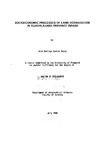Socioeconomic processes of land degradation in Guadalajara province (Spain)
| dc.contributor.supervisor | Charlton, Clive | |
| dc.contributor.author | Garcia Perez, Jose Domingo | |
| dc.contributor.other | School of Geography, Earth and Environmental Sciences | en_US |
| dc.date.accessioned | 2011-05-11T11:54:23Z | |
| dc.date.available | 2011-05-11T11:54:23Z | |
| dc.date.issued | 1996 | |
| dc.identifier | Not available | en_US |
| dc.identifier.uri | http://hdl.handle.net/10026.1/385 | |
| dc.description | Merged with duplicate record 10026.1/662 on 01.02.2017 by CS (TIS) | |
| dc.description.abstract |
Despite the great growth and interest in the study of socioeconomic processes of land degradation in many parts of the world, relatively little attention has been paid to these in Spain. Foresters play an important part in the national strategy to solve the problems of land degradation. It might be expected that after the changes which restored political democracy in Spain in the late 1970s, a reorganization of the way the planning and implementation of soil and water conservation projects through reforestation would be effected. The reforestation agencies of the Government could have improved the effectiveness of conservation by acknowledging and dealing with the need to study the socioeconomic processes of land degradation and involve affected people in the decision making process in planning. This is the main problematic which the thesis addresses. The thesis considers the way issues of land degradation are studied, and how the results of these studies have been adopted and put into practice by Spanish foresters. The workings of the Spanish State and powerful economic interests are considered to be major players determining forestry practice and the outcome of conservation. Some of the most relevant methods in current planning for soil and water conservation, namely those stemming from practice and research into the promotion of participation of affected people, are largely absent from Spanish academic studies and/or planning circles for reforestation projects. The thesis considers the advantages and disadvantages of participatory and multidisciplinary approaches to research with the aim of providing an improved understanding of land degradation processes. The participatory approach is also appraised for its practical value to those involved in planning reforestation projects. The thesis concludes that the dilemma faced by successive Spanish Governments regarding reforestation is one of decision making in planning, involving not only powerful interests, but also those of the people affected. The mismatch between what in Governmental circles is acknowledged as necessary (the participation of the people affected in the decision making process for conservation) and its practice, is the result of the inadequate professional composition of planning teams. The introduction of social science specialists to all the stages of the planning cycle is necessary to improve understanding of the socioeconomic processes of land degradation. For such improvement to occur the perceptions of land users must be included. In so doing it will increase the possibilities of more successful soil and water conservation projects. | en_US |
| dc.description.sponsorship | Faculty of Science of the University of Plymouth,the British Council in Madrid | en_US |
| dc.language.iso | en | en_US |
| dc.publisher | University of Plymouth | en_US |
| dc.subject | Geography Ecology | en_US |
| dc.title | Socioeconomic processes of land degradation in Guadalajara province (Spain) | en_US |
| dc.type | Thesis | |
| dc.identifier.doi | http://dx.doi.org/10.24382/3290 | |
| dc.identifier.doi | http://dx.doi.org/10.24382/3290 |
Files in this item
This item appears in the following Collection(s)
-
01 Research Theses Main Collection
Research Theses Main


